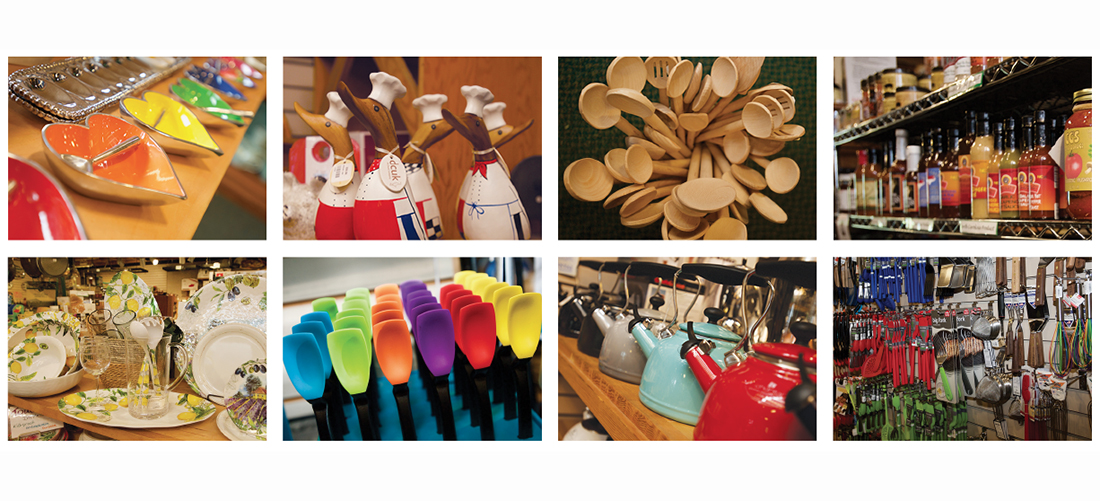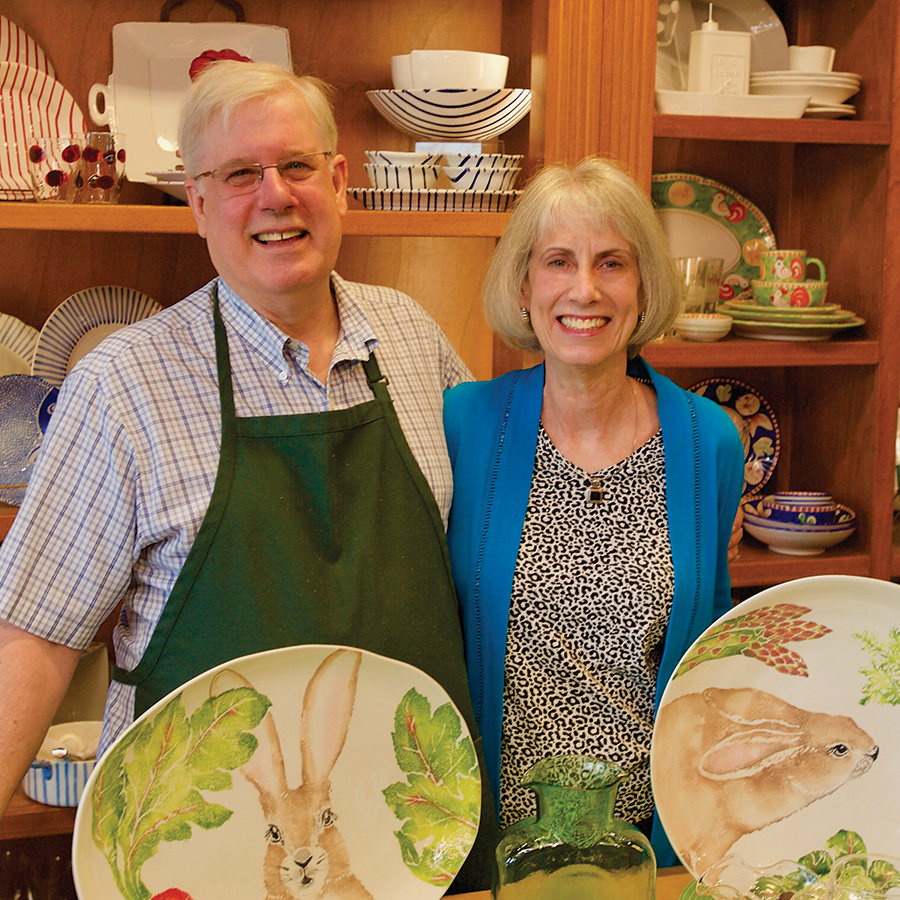
At Greensboro’s lone homegrown kitchen store, friendly is the extra ingredient
By Maria Johnson • Photographs by Sam Froleich
As you might expect, Julia (as in Julia Child) and Jacques (as in Jacques Pépin) love hanging out at The Extra Ingredient, a gourmet kitchen store in Greensboro.
The duo usually show up after lunch and chill in the back room, which doubles as a business office, stockroom and a surprisingly utilitarian break room, albeit one with very nice Cuisinart coffee makers.
On this particular day, Jacques and Julia are jazzed. Jacques jumps on a visitor, literally, and Julia pulls used paper napkins out of the trash and chews them with great interest.
Hmm. Flaky. Layered. One might say parchment-like.
Inspired, Jacques sniffs out a tennis ball and commences gnawing.
Felty, he seems to say, with a hint of rubber.
True, hunger makes animals of us all — and Jacques and Julia are part golden retriever — but spending time at The Extra Ingredient has a way of boosting the appetite and the ability to satisfy it.
How else to explain Art and Martha Nading’s 34 years in business? In a time when mom-and-pop stores are dropping like — sorry, foodies — flies, the shop stands as one of 17 locally owned, non-franchise stores among Friendly Center’s 130 tenants.

They’re also the only homegrown kitchen store in town.
Gone are Cook’s Corner and its later iteration, Roosters. Rest in peace, Tobacco USA. The Extra Ingredient is the only local player left on the bricks-and-mortar field with chains Williams Sonoma and Sur La Table and a few department stores with “better” home sections.
Then there’s the elephant in every retail room: the internet.
“Is Amazon going to own the entire world?” Art asks earnestly. “These things are out of our control, but we are trying to adapt. We have totally reinvented ourselves.”
The Nadings wrote the original recipe in the early 1980s. Art had just earned an M.B.A. at Wake Forest University, and he had planted a foot on the first rung of the corporate ladder at Western Electric in Greensboro.
He spent his days formulating business plans.
“I was bored,” he says. “It wasn’t very creative and everybody around me was saying, ‘I can’t wait to retire.’ It was all about what they were going to do, not what they were doing now. It was very sad.”
His bride, Martha, a UNCG alumna and a native of Winston-Salem like Art, applied her fashion merchandizing smarts at upscale women’s stores — Images in Clemmons and Montaldo’s in Greensboro, both locally owned.
An idea stirred in the young couple’s minds: What if they opened their own kitchenware store?
They loved to cook and entertain, and they relished the swell of nouvelle American cuisine or “something besides a steak,” as Art puts it. Martha Stewart’s first book, Entertaining, was published in 1982, and the Nadings ate up the do-it-yourself ethos.
At home, they served homemade bread, shrimp scampi and cannoli to their supper club friends. Heck, they even had a pasta maker, which put them in the culinary elite at the time.
Using his analytical skills, Art wrote a business plan for himself and Martha. They studied magazines about food and franchising, and they scouted the few gourmet stores that existed in the area. Winston-Salem had The Stocked Pot. Greensboro had Cook’s Corner.
Charlotte had zip. The Nadings considered launching their business there, but an opportunity appeared closer to home. A space now occupied by Athleta became vacant in Friendly Center.
Art’s father, Henry, a real estate agent who had managed Thruway Shopping Center in Winston-Salem, urged the couple to grab the chance.
“He felt Friendly Center was the best location in North Carolina,” Art says.
With financial backing from their parents — plus the young couple’s savings and a bank loan — Art and Martha opened The Extra Ingredient in 1985.
Martha came up with the store’s name while sitting — where else? — at the kitchen table. Art pounced on it because the name suggested more than cooking utensils.
‘’To me, it opened up the doors for us to be more,” he says. “It put us in the category we had to be in.”
Looking back, Art describes those early years as a relatively easy time for an energetic pair of young folks to open a store.
“People weren’t as sophisticated as they are now, “ he observes. “There was lots of room for error. It was a beautiful time to be who you wanted to be.”
Shoppers back then would have found essentially the same things they find in the store today: soothing music, helpful staff, high-end pots, pans and prep tools, serving dishes and utensils, tabletop and glassware, gadgets, linens and something exotic for the time — fresh, whole-bean coffee.
The perky smell filled the store, and the Nadings kept a pot of hot java, with tasting cups, on standby for customers. Martha made it her mission to educate people about the nature of good coffee. To wit, it’s a perishable food meant to be consumed while fresh.
“In the grocery stores, it should be with the oranges and apples,” she says.
The Joe was a hit from day one.
Then, now and always, roasted coffee beans have been the store’s top seller.
The rest of sales depended on customer tastes. For a long time, the Nadings had a secret weapon in sussing out the trends: Joel McLendon.
McLendon, a rep for various kitchen supply lines, was in his mid-70s when the Nadings were just getting off the ground. He had started out by selling toasters for Sears at age 18.
“He nurtured us along,” Martha remembers. “He had this great positivity, continuously.”
“I miss him so much,” says Art.
McLendon died in Dallas, Texas, at age 99, in 2012.
By then, the Nadings were experienced riders on the retail roller coaster. They’d opened and closed a store in Myrtle Beach and moved to a new slot, their current location, in Friendly Center. They’d watched sales climb on the strength of the nesting boom and the proliferation of TV cooking shows — then nose dive in the Great Recession of 2008, when sales flopped like a soufflé on standby.
A decade later, the Nadings and their dedicated staff of part-timers are still climbing back in a retail landscape altered by another major force: the roaring machine of the internet. Their strategy? Embrace it, figure it out, use it.
“You have to have Facebook. You have to have Instagram. You have to have a website,” says Martha.
“You can’t move back in time,” adds Art. “You have to move forward. It’s growing all the time, the multichannel, multimedia approach.”
Three years ago, they started selling their wares — including whole-bean coffee — from a comprehensive website. Online sales have grown steadily as customers have figured out that, item for item, the store’s prices are competitive.
“Everybody’s becoming educated to the fact that Amazon has the same prices as everybody else,” Martha notes. “Sometimes, we’re cheaper.”
The store also competes well with other bricks-and-mortar operations, says Art.
Foot traffic, while slimmer than pre-2008 levels, is steady at The Extra Ingredient, the Nadings say. They have loyal customers who are addicted to the coffee and social interaction, while others are brought in by an increasingly diverse stock.
In recent years, the store has added more packaged food — sauces, jellies, cookies, candy and such. Frames, candles, mugs and decorative umbrellas lend a gift-shop feeling. The snarky dish towels are a hit. So are trendy pieces like the Supoon, a goose-necked silicone spoon and scraper, and novelty items like the “Li’l Wieners” erasers packaged in a can like Vienna sausages.
Every Saturday, the store hosts an event for customers, whether it’s a demonstration of cobbler-making or a tasting of local honey.
“We are constantly looking for ways to make it more exciting,” says Art. “We often say we’re in the entertainment business.”
“People want to be dazzled,” adds Martha.
In some ways, the Nadings’ customers have changed over the years. No longer is the kitchen the province of women only. More men shop for kitchenware, alone or with their mates. The Nadings and their suppliers try to cultivate culinary families; couples who register for wedding gifts at the store receive a free Vietri dish that says “Amore.”
The Nadings also target shoppers who want healthy and environmentally friendly choices. The store carries reusable silicone straws — a replacement for disposable plastic ones — cast iron cookware, which is growing in popularity with young people.
Often, people come in looking for an item they remember their mothers or grandmothers using in the kitchen. Longtime saleswoman Kelly Albright remembers a man who didn’t know the name of the tool he wanted, so she did what she usually does with stumped customers.
“You just start showing them things, and eventually you figure it out,” she says.
He wanted a pastry cutter.
Another challenge: kitchen vocabulary is often regional.
“ ‘Spatula’ has many different meanings,” Albright says laughing, adding that it can be used to describe a flipper, a bowl scraper or a flat metal blade.
Saleswoman Karen Dolan notices that many customers like to talk about what they’re cooking, and they ask for advice.
“When they come in for a springform pan for a cheesecake, they want to know how you do it,” she says.
For this reason, the Nadings hire salespeople who know their way around the kitchen and provide them with hands-on training, often by vendors, so they can explain how to use products.
“When you say, ‘I’ve used that,’ it makes a big difference to people,” says Dolan.
Shoppers appreciate the store’s community roots, too, says salesman David Hagaman.
“I think customers are aware that we are local and will specifically shop with us because of that,” he says.
The Nadings, in turn, lean local in their business dealings because they want their spending nourish the area.
“We live here,” Art says.
“It’s our community,” says Martha.
They buy coffee beans from four roasters, two of them local: Fortuna Enterprises and Piedmont Roasting Company. They also support local causes and programs such as Greensboro Urban Ministry; the Edible Schoolyard at the Greensboro Children’s Museum; The Arc of Greensboro, which provides services to people with development disabilities; and Alight Foundation, which supports local breast cancer patients and their families.
Though they’re stalking traditional retirement age — he’s 63, she’s 64 — the Nadings have no plans to turn off the lights any time soon. With their two sons grown and living elsewhere — one in Houston, Texas, and one in Telluride, Colorado — and their own parents now deceased, the couple are happy to have the store to occupy their hearts and minds.
“We are very blessed,” says Martha.
“We are in fairly decent health,” says Art. “For me, the stimulation is a way to stay healthy.”
The challenge of running a small business in the Age of Big keeps them as sharp as the premium carbon steel knives they sell.
“You can’t just be local,” says Art. “You gotta be good.” OH
Maria Johnson is a contributing editor of O.Henry





